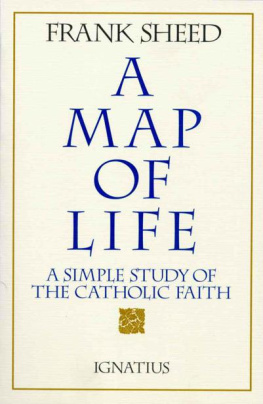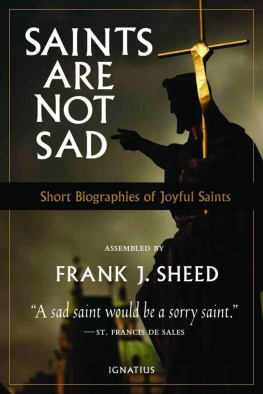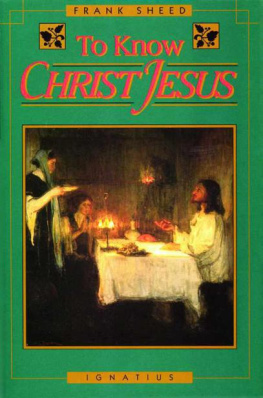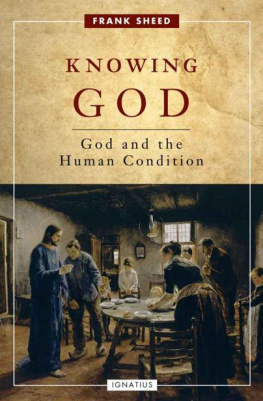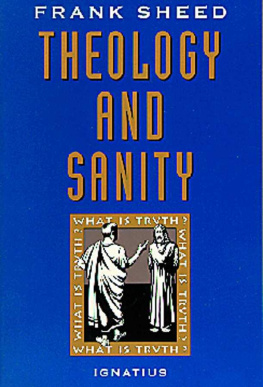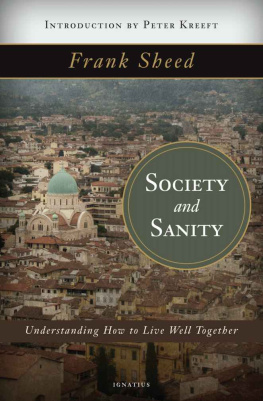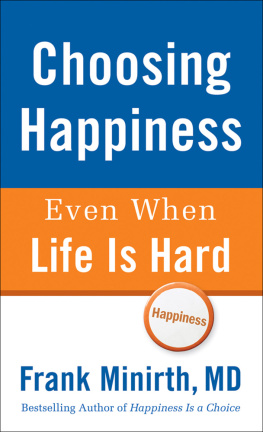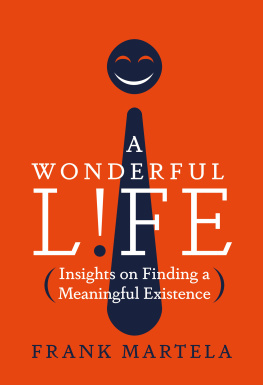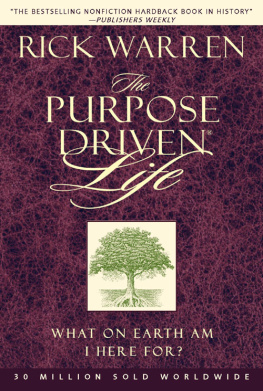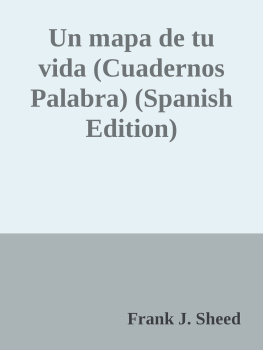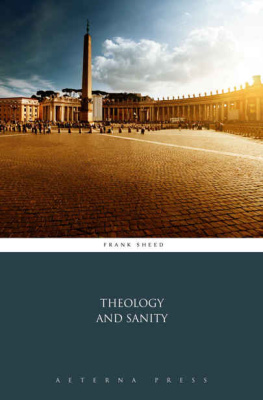A MAP OF LIFE
FRANK SHEED
A MAP OF LIFE
A Simple Study of the Catholic Faith
IGNATIUS PRESS SAN FRANCISCO
Originally published by Sheed & Ward, London
1933 F. J. Sheed
All rights reserved
Published with ecclesiastical approval
Cover by Roxanne Mei Lum
Reprinted with permission of W. Sheed
1994 Ignatius Press San Francisco
ISBN 978-0-89870-474-7
Library of Congress catalogue number 93-80278
Printed in the United States of America
CONTENTS
INTRODUCTION
T HE TRAVELLER through a strange country usually gets vivid impressions of individual things, but only a confused impression of the country in its totality. He remembers this mountain and that stream and the other village, but how one is related to the other, and the general winding of roads that he has barely glimpsed, cannot in the nature of things stand clear in his mind; and a map of the whole country seen at the end of his travels may very well be full of surprises and is, in any case, a totally new view. In very much the same way, a traveller through life gets vividsometimes extremely vividimpressions of things near at hand, confused impressions of things seen at a distance or only heard of, but of the whole plan of life, no idea at all. In his mind will be a jumble of facts, tossed about in any orderGod, sin, church-going, disease, sacraments, suffering, the treason of friends, hostilities, death and the fear of death, money and the loss of it, God-made-manand so on without end. But which of these things are big things and which of them are little, he will not know with certainty: the things that have come nearest to himself will seem big things; the remoter things will seem small.
And of the relations of these things one to anotherhow one thing agrees with, or conflicts with, anotherof all this, merely by dint of living, he will have only the most confused and uncertain impression. In fact, it may easily happen that a man who merely lives, and neither reflects nor is taught, does not even suspect relationships but thinks of all things as accidents with no reason in themselves save that they happened, and no connection with each other save that one came earlier and one came later. Because of this confusion, I propose to try to make what may roughly be called a map of lifea scale map in which the principal natural features will be shown in their right proportions and the roads between them drawn in. This map will not be of my own drawing, fruit of my own experience of life. Nor will it be of any mans drawing. It will be a transcript of what God, the Author of life, has revealed as to the meaning of the whole and the relations of the parts.
Nor will it be a demonstration. Maps do not prove, but only state. There are only two reasons for trusting a map: one is the authority of the map-maker: the other is ones own experience, when one has travelled the road with its guidance. The second is normally of less practical value. We need to be assured of a maps trustworthiness at the beginning of a journey. A map, therefore, must be accepted or rejected according to the confidence the map-maker deserves. In this instance, fortunately the map-maker is God. In this effort to set out the plan of life, there will be no attempt anywhere to prove the truth of what is said, but only to state what, according to the Church he founded, God has said.
THE PROBLEM OF LIFES PURPOSE
T O THE DETACHED OBSERVER, man is something of a curiosity. He lives in two worlds at once, and this not as a being who belongs to one world and has simply got tangled up in another, but as a being who belongs essentially to both of them. God, who alone exists in his own right, who is all-knowing and all-powerful, who exists without the shadow of limitation, made all things. Considering the beings God has made, we find two broad categories, spirit and matter.
Spirit is being that has the power of knowing and willing. Matter is being that has not these powers. There is a more obvious but less important distinction between them: matter can be perceived by the senses, spirit cannot.
Of Gods creatures, there are some that are pure spiritsangelswith no material part. There are some that are purely materialanimals, plants,- stones, and the restwith no spiritual part. Between them is man. In him alone spirit and matter are united: by his soul, he is a spirit as the angels are; by his body, he is part of the material universe.
And, as has already been said, he belongs to both worlds by his essence. He is not simply a spirit who is for the moment tied down to, or tied up in, a body. It is of his very nature to be a union of matter and spirit.
The soul of man is not more essentially a partner in the human compound than bis body; but it is the more important partner. For, in the first place, it is the principle of life in the body: it remains with the body so long as the body is capable of being animated by it; the body corrupts, whereas the soul continues in existence. And in the second place, it knows and wills: that is, it has the two faculties of intellect and will by which it can enter into conscious and determined relationship with all that is.
Such a being, then, is man. It is life as it concerns man that is the business of this map.
We shall understand the map better if we grasp its universal necessity. A man may very well say that whether there is or is not a divine revelation as to the meaning of human life, it is at any rate only of academic interest, desired by none save the dwindling number who like things cut and dried and take comfort in the voice of authority.
For a man who reasons thus we must show that an acceptance of the revelation of God as to the meaning of life has a bearing not only upon holy living, but even upon sane living; that only those who believe in such a revelation can shape their own lives correctly or help their fellow men. Those who do not accept the revelation, even if they have the best will in the world (which not all men have), can neither direct their own lives aright nor help other mensave accidentally and within a very narrow field. From such men the world has little to hope and an immense amount to fear. And into their hands the world is tending more and more to fall. In a word, the reason for their helplessness, both in relation to themselves and in relation to others, is that they do not know what a man is .
You do not truly know what anything is until you know what it is for . Knowing what a thing is made of, even knowing whom a thing is made by, these things are but scanty knowledge, impotent of themselves to lead to fruitful action. The complete knowledge demands a knowledge of purpose. A very crude instance may make this sufficiently obvious truth still more obvious. Imagine a man who has never shaved and suppose that he suddenly discovers a razor. He does not know what it is, but he discovers that it cuts. Whereupon he uses it for cutting wood. He does not cut a great deal of wood and he ruins the razor, leaving it fit only for the scrap-heap. The point is that he has used it without knowing its purpose; and save by accident such use must always be misuse. And in the face of the general proposition that nothing can be used aright until its purpose is known, the man who uses anything at all without such knowledge is acting blindly. He may mean well, but meaning well is not a substitute for knowledge of purpose.
Obviously, the perfect way to know the purpose of a thing is to find out from its maker: any other method leaves too many loopholes for error.
Apply this principle to man himself: we cannot use ourselves aright nor help any other man till we know what man is for. We can meddle with him, tinker with him, mean well to him, but, save in a limited way, we cannot help him.
Here we must make a short digression. There are only two ways in which anything can come to be. Either it is intentional or accidental: that is, either someone intended it or it merely chanced. The thing that is intentional has a purpose; accidents have no purpose. Humanity, like other things, must be either an accident and so purposeless, or else have been made with intent. Catholics know that man was made, and made by an intelligent being who knew the purpose of his own action. Further, God who made us and knew what he made us for has told us what he made us for. Accepting his Word, we know the purpose of our existence, and we can proceed to live intelligently according to it. Short of this knowledge, intelligent living is not possible for us.
Next page
